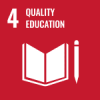Medical Science Club FKKMK UGM discussed the topic “Quarter Life Crisis: Leading to Anxiety or Depression” with speakers Azri Agustin, Clinical Psychologist, Faculty of Psychology UGM, and Ronny Tri Wirasto, lecturer of Psychiatric Medicine at FKKMK UGM on Sunday, (13/6).
Azri explained that Quarter Life is the age of middle age, which is 18-30 years, a transition period from the adolescent phase to the adult phase.
“During this transition period, there are developmental tasks, such as starting to be independent, tasks to develop a career such as choosing an education, completing it, and choosing a career to pursue. In addition, there are also demands from the society to start looking for a partner, form a family, and become financially secure,” said Azri.
According to Azri, quarter-life will become a crisis if there is an imbalance between the demands of development tasks during the transition period and our ability to overcome them.
Furthermore, she mentioned the signs a person is experiencing a quarter-life crisis. First, they will begin to doubt their abilities. They would ask themselves “Can I do it? Did I fail?”. Second, they would feel unmotivated and worry about the future. Third, they would feel disappointed about their achievements. Finally, they would start to question the purpose of life.
“If this crisis continues unaddressed, it will lead to more severe mental health disorders, such as anxiety, worry, and fear. Judging ourselves as incapable, worthless is also an indication of depression,” said Azri.
Azri explained that someone who is already in the anxiety stage will worry about things that are considered a source of threat, experience motor tension (feeling tense, uncomfortable, restless, increased heart rate), and experience increased alertness and decreased concentration. Meanwhile, depression is characterized by three main symptoms: excessive moodiness/sadness, loss of interest, and extreme fatigue.
“These symptoms persist every day. Waking up feeling tired, feeling sad, and even crying. Not interested in eating, shopping, and doing activities. A person is said to have depression when these symptoms persist for up to two weeks,” she said.
Finally, she revealed that quarter-life crises are common.
“To face the quarter-life crisis, focus and communicate your hopes, your problems, and communicate with those around you because the best medicine is the one available. Optimize it. There are parents, friends, lecturers, and people whom you can talk with to map and provide objective facts about you. Also, do not hesitate to ask for help from a psychologist or professional. You don’t have to wait for the problem to become complicated to go to a psychologist,” she said.
In line with Azri, Ronny said that we need to prioritize life with thinking, emotions, and behavior in facing a quarter-life crisis.
“Prioritize the big things first, such as family, friends, and so on. Next, do not fill your life with things that are unimportant and irrelevant to life. If we fill it with those things we will lose the meaning of life itself,” said Ronny.
Source: https://www.ugm.ac.id/id/berita/21247-kiat-menghadapi-quarter-life-crisis



